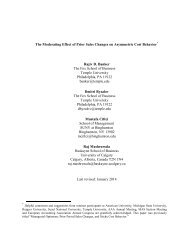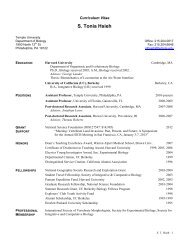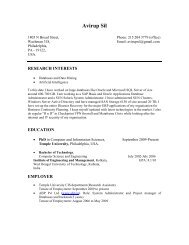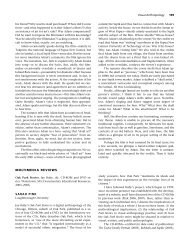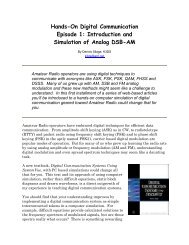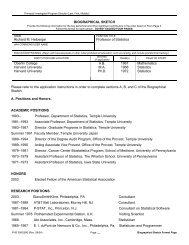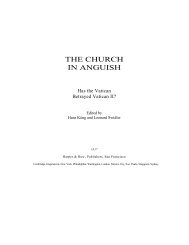The Socratic Fallacy and the Epistemological ... - Welcome to Astro
The Socratic Fallacy and the Epistemological ... - Welcome to Astro
The Socratic Fallacy and the Epistemological ... - Welcome to Astro
You also want an ePaper? Increase the reach of your titles
YUMPU automatically turns print PDFs into web optimized ePapers that Google loves.
(<br />
( <br />
1<br />
"'<br />
<br />
,<br />
I " <br />
(<br />
<strong>The</strong> <strong>Socratic</strong> <strong>Fallacy</strong> <strong>and</strong> <strong>the</strong><br />
<strong>Epistemological</strong> Priority of<br />
Definitional Knowledgi<br />
David Wolfsdorf<br />
I<br />
n<br />
'1<br />
,I<br />
I<br />
I<br />
Geach <strong>and</strong> <strong>the</strong> <strong>Socratic</strong> <strong>Fallacy</strong><br />
In 1966 P.T. Geach published a paper on Euthyphro in which he criticized<br />
Pla<strong>to</strong>'s Socrates for several logical errors. <strong>The</strong> most widely discussed has<br />
been what Geach called <strong>the</strong> '<strong>Socratic</strong> fallacy'. According <strong>to</strong> Geach, Pla<strong>to</strong>'s<br />
Socrates is committed <strong>to</strong> <strong>the</strong> following two propositions:<br />
(A) If you know that you are correctly predicating a given term 'T,<br />
you must know what it is <strong>to</strong> be T, in <strong>the</strong> sense of being able <strong>to</strong><br />
give a general criterion for a thing's being T.<br />
(B) It is no use <strong>to</strong> try <strong>to</strong> arrive at <strong>the</strong> meaning of 'T by giving<br />
examples of things that are T. 2<br />
This is why Geach thinks commitment <strong>to</strong> (A) <strong>and</strong> (B) is fallacious:<br />
We know heaps of things without being able <strong>to</strong> define <strong>the</strong> tenns in<br />
which we express our knowledge. Fonnal definitions are only one way<br />
of elucidating terms; a set of examples may in a given case be more<br />
This paper is dedicated <strong>to</strong> <strong>the</strong> Philosophy Department at Bos<strong>to</strong>n University,<br />
especially Charles Griswold <strong>and</strong> David Roochnik, in gratitude for welcoming me<br />
under <strong>the</strong>ir aegis over <strong>the</strong> past two years.<br />
2 P.T. Geach, 'Pla<strong>to</strong>'s Euthyphro: An Analysis <strong>and</strong> Commentary', Monist 50 (1966)<br />
369-82, at 371
36 David Wolfsdorf<br />
( ( (<br />
<strong>The</strong> <strong>Socratic</strong> <strong>Fallacy</strong> 37<br />
useful than a formal definition ... If <strong>the</strong> parties <strong>to</strong> a discussion are<br />
agreed, broadly speaking, about <strong>the</strong> application of a term, <strong>the</strong>n <strong>the</strong>y<br />
can set out <strong>to</strong> find a criterion for applying it that shall yield <strong>the</strong> agreed<br />
application. On <strong>the</strong> o<strong>the</strong>r h<strong>and</strong>, if <strong>the</strong>y are agreed on <strong>the</strong> criterion for<br />
applying <strong>the</strong> term, <strong>the</strong>n <strong>the</strong>y can see whe<strong>the</strong>r this criterion justifies<br />
predicating "T" of a given example. But if <strong>the</strong>re is no initial agreement<br />
ei<strong>the</strong>r on examples of things that certainly are T or on criteria for<br />
predicating "T", <strong>the</strong>n <strong>the</strong> discussion is bound <strong>to</strong> be abortive; <strong>the</strong> parties<br />
<strong>to</strong> it cannot know what <strong>the</strong>y are about - <strong>the</strong>y do not even know<br />
whe<strong>the</strong>r each of <strong>the</strong>m means <strong>the</strong> same by saying "T". Any profit <strong>the</strong>y<br />
gain from <strong>the</strong> discussion will be per accidens; per se <strong>the</strong> discussion is<br />
futile.'<br />
In considering Geach's accusation, I begin with two qualifications.<br />
First, (A) <strong>and</strong> (B) are expressed as general semantico-epistemological<br />
principles. <strong>The</strong> symbol 'T' implicitly ranges over all predicates. It is at<br />
least questionable whe<strong>the</strong>r Socrates is committed <strong>to</strong> principles of such<br />
generality. He is mainly interested in human virtue <strong>and</strong> its putative<br />
components. So it will be prudent, at least initially, <strong>to</strong> restrict consideration<br />
<strong>to</strong> this domain. Second, it is appropriate <strong>to</strong> alter (A) <strong>and</strong> (B) from <strong>the</strong><br />
meta-linguistic terms in which Geach formulated <strong>the</strong>m <strong>to</strong> object-language<br />
terms more fitting Socrates/ mode of conceptualization. Socrates<br />
is not interested in <strong>the</strong> meanings of words, but in <strong>the</strong> identity of human<br />
virtue <strong>and</strong> its components. Thus/ (A) <strong>and</strong> (B) misrepresent Socrates. A<br />
better formulation of (A) is:<br />
(A/) If one does not know what F is, one cannot know for any x<br />
whe<strong>the</strong>r x is an instance of F (where <strong>the</strong> symbol'F' ranges over<br />
<strong>the</strong> domain of human virtue <strong>and</strong> its components).<br />
(A') states that definitional knowledge of F is epistemologically prior<br />
<strong>to</strong> knowledge of instances ofF. Accordingly, (B) should be reformulated<br />
as:<br />
(B/) One cannot achieve definitional knowledge of F through <strong>the</strong> use<br />
of instances of F.<br />
Thus/ Geach/s charge amounts <strong>to</strong> <strong>the</strong> following. Ifone knows that <strong>the</strong><br />
members of a set exemplify F, <strong>the</strong>n one can use those members <strong>to</strong><br />
determine what F is. Alternatively, if one knows what F is, one can use<br />
that knowledge <strong>to</strong> determine whe<strong>the</strong>r a given entity is an instance of F.<br />
But if one nei<strong>the</strong>r knows what F is nor which instances are of F, <strong>the</strong>n<br />
pursuit of knowledge of F or of knowledge of instances of F is futile.<br />
Fur<strong>the</strong>rmore, Geach believes that (A') is simply wrong because in many<br />
cases we know instances ofF without being able <strong>to</strong> give a definition of F.<br />
A common response <strong>to</strong> Geach is that Socrates in fact uses examples<br />
of F in <strong>the</strong> pursuit of definitional knowledge of F. <strong>The</strong>refore, Socrates<br />
cannot be committed <strong>to</strong> (A'). For example, in Laches Socrates grants that<br />
agents who perform paradigmatic hoplite deeds (remain in rank, defend<br />
against <strong>the</strong> enemy, <strong>and</strong> do not flee) exemplify courage, but he suggests<br />
that agents who perform a number of o<strong>the</strong>r act-types also exemplify<br />
courage. Thus, he encourages Laches <strong>to</strong> consider what all such agents<br />
have in common: /50 try again <strong>and</strong> first tell me this: What is that thing<br />
that is <strong>the</strong> same in all cases?/4<br />
Accordingly, it has been argued that Socrates is not committed <strong>to</strong> <strong>the</strong><br />
view that definitional knowledge of F is epistemologically prior <strong>to</strong><br />
knowledge of all instances of F. Ra<strong>the</strong>r, definitional knowledge of F is<br />
necessary for borderline or controversial cases, for example, whe<strong>the</strong>r<br />
Euthyphro's fa<strong>the</strong>r's peculiar homicide is unholy. More broadly, <strong>the</strong>n,<br />
definitional knowledge of F is necessary for ethical expertise, yet one<br />
may know a number of common instances of F without being an expert.<br />
Such a position requires that claims Socrates makes resembling (A')<br />
actually reflect a weaker principle. Yet, I contend, evidence from a<br />
number of early dialogues, in particular from <strong>the</strong> st<strong>and</strong>ardly accepted<br />
early definitional dialogues indicates that Pla<strong>to</strong> actually intended <strong>to</strong><br />
advance Socrates' commitment <strong>to</strong> a set of principles that are collectively<br />
even stronger than (A'). (A') is currently labeled '(pr, a practice with<br />
which I will hereafter conform; hence:<br />
(P) If one does not know what F is, one cannot know for any x<br />
whe<strong>the</strong>r x is an instance of F.<br />
<strong>The</strong> evidence indicates that in addition <strong>to</strong> (P) Socrates is committed <strong>to</strong>:<br />
3 Ibid., 371-2<br />
4 La 191elO-ll. Below we will see that in fact Socrates rarely uses examples in <strong>the</strong> way<br />
that Geach suggests one might or should.
( ( (<br />
38 David Wolfsdorf<br />
<strong>The</strong> <strong>Socratic</strong> <strong>Fallacy</strong> 39<br />
(D) If one does not know what F is, <strong>the</strong>n one cannot know whe<strong>the</strong>r<br />
F has a property P (where <strong>the</strong> attribution of P <strong>to</strong> F is ethically<br />
substantive).<br />
<strong>The</strong> reason for <strong>the</strong> paren<strong>the</strong>tical qualification in (D) is that, o<strong>the</strong>rwise,<br />
in a discussion of, say, justice, Socrates could not claim <strong>to</strong> know that his<br />
interlocu<strong>to</strong>r <strong>and</strong> he were speaking of justice or whe<strong>the</strong>r <strong>the</strong> name of<br />
justice was 'justice'. <strong>The</strong> fact is that Socrates simply does not entertain<br />
such matters. Presumably, he would find <strong>the</strong>m trivia1. 5<br />
<strong>The</strong> conjunction of (P) <strong>and</strong> (D) yield:<br />
(PD) If one does not know what F is, <strong>the</strong>n one cannot know anything<br />
of ethical substance about F.<br />
Let us look at <strong>the</strong> relevant passages <strong>and</strong> <strong>the</strong> work of those who have<br />
argued that Socrates is not committed <strong>to</strong> (P), (D), or (PD).<br />
II i Vlas<strong>to</strong>s' Denial of <strong>the</strong> <strong>Socratic</strong> <strong>Fallacy</strong><br />
Vlas<strong>to</strong>s' (as well as Beversluis') position depends upon <strong>the</strong> 'segregation<br />
of two sets of early dialogues, <strong>the</strong> so-called elenctic <strong>and</strong> transitional<br />
dialogues. <strong>The</strong> transitional dialogues whose content presently matters<br />
include Hippias Major <strong>and</strong> Meno. 6 Crucial <strong>to</strong> Vlas<strong>to</strong>s' distinction between<br />
elenctic <strong>and</strong> transitional dialogues is <strong>the</strong> view that in <strong>the</strong> elenctic dialogues<br />
Socrates' investigative method is adversarial insofar as 'Socrates'<br />
5 I am grateful <strong>to</strong> an anonymous referee for pointing out this difficulty.<br />
6 John Beversllfis ('Does Socrates Commit <strong>the</strong> <strong>Socratic</strong> <strong>Fallacy</strong>?', American Philosophical<br />
Quarterly 24 [19871 211-23), who closely follows Gregory Vlas<strong>to</strong>s ('Socrates'<br />
Disavowal of Knowledge', Philosophical Quarterly 35 [1985]1-31) writes: '[in <strong>the</strong><br />
transitional dialogues Socrates is] a thinker whose views are often radically at odds<br />
with those of his counterpart in <strong>the</strong> early [Le., elenctic] dialogues.' (221, n 4, cited<br />
from Hugh H. Benson, '<strong>The</strong> Priority of Definition <strong>and</strong> <strong>the</strong> <strong>Socratic</strong> Elenchus', Oxford<br />
Studies in Ancient Philosophy, 8 [1990119-65, at 24.) One explanation for this transition<br />
is that Pla<strong>to</strong> became increasingly interested in ma<strong>the</strong>matics <strong>and</strong> <strong>the</strong> axiomatic<br />
deductive method, where '<strong>the</strong> priority of definition in <strong>the</strong> artificial languages of<br />
axiomatic method is a commonplace.' (Note that this is Benson's description [1990,<br />
24-5, n 11] of Vlas<strong>to</strong>s' account in an unpublished manuscript of Vlas<strong>to</strong>s', on which<br />
d. Vlas<strong>to</strong>s, 'Elenchus <strong>and</strong> Ma<strong>the</strong>matics: A Turning Point in Pla<strong>to</strong>'s Philosophical<br />
Development', American Journal ofPhilology 109 [1988] 362-96.)<br />
formal role is never <strong>to</strong> defend a <strong>the</strong>sis of his own, but only <strong>to</strong> examine<br />
<strong>the</strong> <strong>the</strong>sis of his interlocu<strong>to</strong>r.'7 In contrast, Vlas<strong>to</strong>s believes that in <strong>the</strong><br />
so-called transitional dialogues Socrates ab<strong>and</strong>ons <strong>the</strong> adversarial<br />
method. This is false. As Benson notes, Socrates' conversations with<br />
Hippocrates in Protagoras, with Melesias in Laches, <strong>and</strong> with Cri<strong>to</strong> in Cri<strong>to</strong><br />
are not adversarial. Fur<strong>the</strong>rmore, in <strong>the</strong> investigations in Meno <strong>and</strong><br />
Hippias Major, Meno <strong>and</strong> Hippias respectively propose <strong>the</strong> first three<br />
definitions. Moreover, in Laches Nicias' definition crucially depends<br />
upon Socrates' view that a man is good only insofar as he is knowledgeable;<br />
<strong>and</strong> in Euthyphro, <strong>the</strong> fourth definition crucially depends upon<br />
Socrates' suggestion that <strong>the</strong> holy is a part of <strong>the</strong> just.8<br />
More generally, as I have recently argued, <strong>the</strong>re is no 'demise of <strong>the</strong><br />
elenchus,g in <strong>the</strong> so-called transitional dialogues. Throughout <strong>the</strong> early<br />
definitional dialogues Socrates pursues definitional knowledge of F in a<br />
consistent manner. Specifically, he pursues true definitions of F by<br />
evaluating proposals (made by himself or his interlocu<strong>to</strong>rs) through<br />
consideration of <strong>the</strong>ir consistency with conditions of <strong>the</strong> identity of F<br />
(so-called F-conditions) that he introduces <strong>and</strong> <strong>to</strong> which he is committed.<br />
Fur<strong>the</strong>rmore, this manner of pursuing definitions is not elenctic in <strong>the</strong><br />
idiosyncratically Vlas<strong>to</strong>sian sense, for Socrates does not try <strong>to</strong> refute<br />
definitions proposedbyhis interlocu<strong>to</strong>rs. Ra<strong>the</strong>r, heconceives ofhimself<br />
as learning from his interlocu<strong>to</strong>rs (for example, Hippias, Thrasymachus,<br />
or Euthyphro) or as engaged in a joint investigation with <strong>the</strong>m (Critias,<br />
Laches <strong>and</strong> Nicias, or Polemarchus), where his own contributions are<br />
intended <strong>to</strong> be cooperative <strong>and</strong> supportive - although unwaveringly<br />
directed <strong>to</strong>ward <strong>the</strong> discovery of truth. lO Consequently, <strong>the</strong> evidence<br />
from Hippias Major <strong>and</strong> Meno for Socrates' commitment <strong>to</strong> (PD) cannot<br />
be segregated by appeal <strong>to</strong> a shift in Socrates' method. And since Vlas<strong>to</strong>s<br />
<strong>and</strong> Beversluis concede that <strong>the</strong> evidence from <strong>the</strong>se texts commits<br />
Socrates <strong>to</strong> (PD), <strong>the</strong>ir argument collapses.<br />
7 Vlas<strong>to</strong>s (1988) 5, cited from Benson (1990) 25<br />
8 Cf. Benson (1990) 25-6.<br />
9 <strong>The</strong> phrase is taken from <strong>the</strong> title of Vlas<strong>to</strong>s' appendix, '<strong>The</strong> Demise of <strong>the</strong> Elenchus<br />
in <strong>the</strong> Euthydemus, Lysis, <strong>and</strong> Hippias Major' in <strong>Socratic</strong> Studies (New York: Cambridge<br />
University Press 1994), 29-33.<br />
10 Cf. David Wolfsdorf, 'Socrates' Pursuit of Definitions', Phronesis 48 (2003b) 271-312.
( ( (<br />
40 David Wolfsdorf<br />
<strong>The</strong> <strong>Socratic</strong> <strong>Fallacy</strong> 41<br />
<strong>The</strong> pertinent passages are:<br />
(1) [Hippias Major] How do you know (oIlJea) what sort of things are<br />
beautiful <strong>and</strong> ugly? Come now, can you say what <strong>the</strong> beautiful is?ll<br />
(2) [Hippias Major] He asks me if I am not ashamed <strong>to</strong> talk about<br />
beautiful practices, when I have clearly been refuted concerning<br />
<strong>the</strong> beautiful, <strong>to</strong> <strong>the</strong> effect that I don't know (oISa) what <strong>the</strong> thing<br />
itself is. "And yet," he willsay, "howwill you know (EllJEt) whe<strong>the</strong>r<br />
or not someone has spoken beautifully, or done any o<strong>the</strong>r thing<br />
whatsoever, when you do not know (ayvoIDv) <strong>the</strong> beautiful?"lz<br />
(3) [Meno] I am so far from knowing (doEVat) whe<strong>the</strong>r or not virtue is<br />
teachable that I do not know (dow.;) at all what virtue itself is ...<br />
Not knowing (dom.;) at all what a thing is, how would I know<br />
(dSEi"v) what sort of thing it is? Or do you think that it is possible<br />
for someone who is completely unacquainted with (ytyvwmm)<br />
Meno is <strong>to</strong> know (doEvat) whe<strong>the</strong>r he is beautiful or wealthy or<br />
well born or <strong>the</strong> opposite of <strong>the</strong>se?B<br />
(4) [Meno] We shall know <strong>the</strong> certainty of this [namely that<br />
virtue comes <strong>to</strong> us by divine inspiration] when, before we attempt<br />
<strong>to</strong> seek how virtue comes about in men, we attempt <strong>to</strong> seek what<br />
virtue itself is by itself. 14<br />
II ii Brickhouse <strong>and</strong> Smith's <strong>and</strong> Lesher's Denials of (P) <strong>and</strong> (D)<br />
In contrast <strong>to</strong> Vlas<strong>to</strong>s <strong>and</strong> Beversluis, Lesher <strong>and</strong> Brickhouse <strong>and</strong> Smith<br />
deny that <strong>the</strong> evidence of <strong>the</strong> so-called transitional dialogues must be<br />
segregated. Still, <strong>the</strong>y argue that this evidence does not commit Socrates<br />
<strong>to</strong> (PD). Lesher dges not discuss (1) or (4). However, since <strong>the</strong> respective<br />
passages come from <strong>the</strong> same dialogues, it is reasonable <strong>to</strong> assume that<br />
his interpretation of (1) would be consonant with his interpretation of<br />
11 Hp Ma 286c8-d2<br />
12 • Hp N1fl 304d5-e2<br />
13 Meno 71a5-b7<br />
14 Meno l00b4-6<br />
(2), which he does discuss, <strong>and</strong> that his interpretation of (4) would be<br />
consonant with his interpretation of (3), which he does discuss. Lesher<br />
claims that Socrates is committed <strong>to</strong> (D), but not (P).tS He admits (3) <strong>and</strong>,<br />
I am assuming, (4) as evidence that Socrates is committed <strong>to</strong> (D). But he<br />
does not admit (2) as evidence of (P). Instead, he interprets (2) as<br />
committing Socrates <strong>to</strong> <strong>the</strong> sufficiency of knowledge of F for knowledge<br />
of examples of F. 16 In o<strong>the</strong>r words, knowledge of F would explain<br />
knowledge ofexamples of F; however, <strong>the</strong>re are o<strong>the</strong>r means of acquiring<br />
knowledge of examples of F. This, Lesher believes, is precisely what <strong>the</strong><br />
question in (2) is asking. How, that is, by what means, since not by<br />
knowledge of F, do you know examples of F?<br />
15 'In <strong>the</strong> Laches, ignorance of <strong>the</strong> essence of virtue is said <strong>to</strong> prevent us from knowing<br />
how best <strong>to</strong> attain virtue (185e5-190b1), <strong>and</strong> this is only one instance of <strong>the</strong> more<br />
general problem (mentioned at Charmides 176a6-8, Meno 71 <strong>and</strong> elsewhere) that<br />
ignorance of a thing's essential nature prevents us from knowing what o<strong>the</strong>r<br />
attributes it may possess or lack. None of <strong>the</strong>se texts however amounts <strong>to</strong> <strong>the</strong><br />
essentialist <strong>the</strong>sis at h<strong>and</strong>: that not knowing <strong>the</strong> essence of F, nei<strong>the</strong>r can one know<br />
whe<strong>the</strong>r a particular thing is F or not' (J.H. Lesher, 'Socrates' Disavowal of Knowledge',<br />
Journal of <strong>the</strong> His<strong>to</strong>ry of Philosophy 25 [19871284-5).<br />
16 'ff I ask someone "how do you know X when you don't know Y?" I might be<br />
attempting <strong>to</strong> discredit his claim <strong>to</strong> know X, but I needn't be. Alternatively, leaving<br />
undecided <strong>the</strong> question of whe<strong>the</strong>r he knows X or not, I might ask him how he<br />
knows X when one way sufficient for knowing X (i.e., knowing Y) is unavailable <strong>to</strong><br />
him. In <strong>the</strong>se cases, lacking knowledge of <strong>the</strong> essence of beauty <strong>and</strong> friendship,<br />
Socrates cannot explain how he knows by appealing <strong>to</strong> <strong>the</strong> knowledge of <strong>the</strong>ir<br />
essence (though that would indeed explain it), but his inability <strong>to</strong> provide this<br />
explanation does not imply that he cannot have knowledge, or that he could have<br />
no o<strong>the</strong>r basis on which <strong>to</strong> support his claim <strong>to</strong> know. An inability <strong>to</strong> explain how<br />
one knows subjects one <strong>to</strong> ridicule <strong>and</strong> contempt, but it does not exclude <strong>the</strong><br />
pOSSibility that one knows after all. <strong>The</strong> essentialist epistemic <strong>the</strong>sis is <strong>the</strong>refore<br />
stronger than any Pla<strong>to</strong>nic text canjustify; nothing so far said prevents Socrates from<br />
knowing that a is F even when he does not know what <strong>the</strong> F is, <strong>and</strong> he seems not <strong>to</strong><br />
have been bo<strong>the</strong>red by any such restriction' (ibid., 285). Lesher also cites Vlas<strong>to</strong>s<br />
here: 'As Vlas<strong>to</strong>s noted, "in <strong>the</strong> Cn<strong>to</strong> Socrates has no trouble ascertaining that escape<br />
would be unjust without invoking any general definition of 'justice' or 'injustice'.'"<br />
(285, n 13; <strong>the</strong> citation is from Vlas<strong>to</strong>s, 1985,23.) Vlas<strong>to</strong>s' point is irrelevant, though,<br />
since Socrates does not claim <strong>to</strong> know that escaping would be unjust. Ra<strong>the</strong>r, he<br />
strongly believes it. <strong>The</strong> situation is similar <strong>to</strong> that in Gorgias where Socrates strongly<br />
affirms that it is better <strong>to</strong> suffer harm than <strong>to</strong> do it, but he disclaims knowledge of<br />
this. <strong>The</strong> question, <strong>the</strong>n, is why in Cri<strong>to</strong> Socrates does not explicitly indicate that<br />
although he believes escape would be unjust, he does not know this.
( ( (<br />
42 David Wolfsdorf <strong>The</strong> <strong>Socratic</strong> <strong>Fallacy</strong> 43<br />
Consideration of <strong>the</strong> broader context in which (2) is embedded exposes<br />
<strong>the</strong> problem of this interpretation:<br />
50 whenever I go home <strong>to</strong> my own house <strong>and</strong> he hears me saying <strong>the</strong>se<br />
things, he asks me ifI am not ashamed that I have <strong>the</strong> face <strong>to</strong> talk about<br />
beautiful practices, when it is so plainly shown, <strong>to</strong> my confusion, that<br />
I do not even know what <strong>the</strong> beautiful itself is. "And how are you <strong>to</strong><br />
know," he will say, "ei<strong>the</strong>r who produced a discourse or anything else<br />
whatsoever, beautifully, arnot, whenyou are ignoran<strong>to</strong>f<strong>the</strong> beautiful?<br />
And when you are in such a condition, do you think it is better for you<br />
<strong>to</strong> be alive than dead?"17<br />
Clearly Socrates' alleged friend is not wondering, as an epistemological<br />
point of concern, by what means o<strong>the</strong>r than knowledge of F Socrates<br />
can know examples of F. Nor is he stressing <strong>the</strong> strangeness of <strong>the</strong> fact<br />
thatSocrates knows examples ofF in <strong>the</strong> absence ofknowledge ofF itself.<br />
Ra<strong>the</strong>r, he is abusing Socrates for daring <strong>to</strong> consider certain entities as<br />
instances of F without knowing what F is. <strong>The</strong> implication is that one<br />
cannot know whe<strong>the</strong>r certain entities are instances of F if one does not<br />
know what F is. 1B<br />
Like Lesher, Brickhouse <strong>and</strong> Smith do not segregate <strong>the</strong> so-called<br />
elenctic <strong>and</strong> transitional dialogues. Even so, <strong>the</strong>y argue that Socrates is<br />
not committed <strong>to</strong> (P) or (D). <strong>The</strong>y discuss eight passages that have been<br />
thought <strong>to</strong> provide evidence for Socrates' commitment <strong>to</strong> (P) <strong>and</strong> (D),<br />
<strong>and</strong> <strong>the</strong>y explain <strong>the</strong>se passages on <strong>the</strong> basis of an alternative conception<br />
of Socrates' commitment <strong>to</strong> <strong>the</strong> epistemological priority of definitional<br />
knowledge. 19 According <strong>to</strong> Brickhouse <strong>and</strong> Smith, Socrates is committed<br />
<strong>to</strong> <strong>the</strong> view that:<br />
17 Hp Ma 304d4-e3<br />
18 It should be added that for comic effect <strong>the</strong> alleged friend is of course speaking<br />
hyperbolically, as elsewhere in Hippias Major. Lacking knowledge of F should not<br />
be grounds for suicide. Moreover, in many early dialogues Socrates discusses<br />
examples of F without knowing F. But I take his severity here <strong>to</strong> mean that one<br />
should not be ignorant of <strong>the</strong> fact that without knowledge of F one cannot know<br />
• exahlples of F. Thus, if one speaks of examples of F, one should do so tentatively.<br />
19 <strong>The</strong> eight passages are: Hp Ma 304d5-e3; Euthphr 4e1-5dl. 6e3-6; La 18ge3-190bl;<br />
Meno 7la5-b7; Prot 312cl-4; <strong>and</strong> R I, 354c1-3.<br />
(BSp) One must know <strong>the</strong> definition of F 'before one can be in a<br />
position <strong>to</strong> judge in general which things are <strong>and</strong> which things<br />
are not' instances of F. 20<br />
Although akin <strong>to</strong> (P), (BSp) differs insofar as it permits that one who<br />
lacks definitional knowledge of F may still know certain instances of F.<br />
In contrast, <strong>the</strong> person who has definitional knowledge of F will be an<br />
expert in matters of virtue, that is 'be in a position <strong>to</strong> judge in general'<br />
instances of F. In support of <strong>the</strong>ir position, <strong>the</strong>n, Brickhouse <strong>and</strong> Smith<br />
must show that <strong>the</strong> passages that seem <strong>to</strong> supportSocrates' commitment<br />
<strong>to</strong> (P) <strong>and</strong> (D) are best interpreted as concerning <strong>the</strong> role of definitional<br />
knowledge in expertise or authoritative judgment. Fur<strong>the</strong>rmore, <strong>the</strong>y<br />
must show that Socrates believes that it is possible <strong>to</strong> know certain<br />
instances of F without definitional knowledge.<br />
In this section I will discuss Brickhouse <strong>and</strong> Smith's treatment of (1)<br />
<strong>and</strong> (2). I will postpone for a later section <strong>the</strong>ir treatment of certain<br />
passages in Euthyphro pertinent <strong>to</strong> (P). With respect <strong>to</strong> (2), Brickhouse<br />
<strong>and</strong> Smith claim that:<br />
<strong>The</strong> sense of challenge is that Socrates is in no position <strong>to</strong> play <strong>the</strong> part<br />
of a judge, <strong>to</strong> lay claim <strong>to</strong> being able <strong>to</strong> tell what is <strong>and</strong> what is not<br />
beautiful. But <strong>the</strong> question "Whoare you <strong>to</strong> judge?" does not challenge<br />
one's claim <strong>to</strong> judge any case at all; it only challenges one's ability <strong>to</strong><br />
judge in general; so "How will you know?" only challenges Socrates'<br />
general access <strong>to</strong> <strong>the</strong> pertinent knowledge. ll<br />
<strong>The</strong> correct interpretation of (2) depends on <strong>the</strong> correct interpretation<br />
of (1) since (2) simply reiterates (1). <strong>The</strong> context in which (1) occurs<br />
prompts <strong>the</strong> investigation of <strong>the</strong> beautiful, <strong>and</strong> in stating (2) at <strong>the</strong> end<br />
of <strong>the</strong> failed investigation, Socrates is emphasizing <strong>the</strong> importance of<br />
investigating <strong>the</strong> definition of <strong>the</strong> beautiful. Here is <strong>the</strong> broader context<br />
in which (1) occurs:<br />
Recently ... someone threw me in<strong>to</strong> a state of aporia as I was criticizing<br />
certainthings in speeches as base <strong>and</strong> praising o<strong>the</strong>rs as beautiful. With<br />
20 Thomas C. Brickhouse <strong>and</strong> Nicholas D. Smith, Pla<strong>to</strong>'s Socrates (New York: Oxford<br />
University Press 1994),46<br />
21 Ibid., 46-7
( ( (<br />
44 David Wolfsdorf<br />
<strong>The</strong> <strong>Socratic</strong> <strong>Fallacy</strong> 45<br />
great disdain he questioned me in <strong>the</strong> following way: "Socrates, how<br />
do you know what sorts of things are beautiful <strong>and</strong> base? Come now,<br />
can you tell me what <strong>the</strong> beautiful is?" But I, useless as I am, was<br />
confused <strong>and</strong> incapable of providing a satisfac<strong>to</strong>ry response. I left <strong>the</strong><br />
company angry <strong>and</strong> reproaching myself, threatening that at <strong>the</strong> first<br />
opportunity I had <strong>to</strong> meet one of you wise men, I would listen, learn,<br />
<strong>and</strong> take care so that I could return <strong>to</strong> <strong>the</strong> questioner <strong>to</strong> contest his<br />
speech. 22<br />
Since <strong>the</strong> text does not state that Socrates was initially attempting <strong>to</strong><br />
pass value judgments on extraordinary objects or in atypical conditions,<br />
we should assume that Socrates' evaluations occurred under normal<br />
circumstances. As such, <strong>the</strong> interroga<strong>to</strong>r was questioning Socrates qua<br />
possessor of conventional beliefs. This is, indeed, consistent with Pla<strong>to</strong>'s<br />
cus<strong>to</strong>mary portrayal ofSocrates as a critic of conventional ethical values.<br />
<strong>The</strong> question 'How do you know what sort of things are beautiful <strong>and</strong><br />
base? Come now, can you tell me what <strong>the</strong> beautiful is?' is, <strong>the</strong>n, general.<br />
By this, I mean that as interroga<strong>to</strong>r, Socrates is asking himself how he<br />
can presume <strong>to</strong> know that anything is beautiful or base when he lacks<br />
knowledge of <strong>the</strong> identity of <strong>the</strong> beautiful. Brickhouse <strong>and</strong> Smith's<br />
comment continues:<br />
Ifone did know what <strong>the</strong> beautiful is, one could, it seems, act as a judge<br />
of beautiful things. But Socrates could well answer his adversary that<br />
he is indeed in a position <strong>to</strong> know in a few cases. 23<br />
<strong>The</strong>ir comment does not make sense in <strong>the</strong> context of <strong>the</strong> Hippias Major<br />
passage since Socrates' adversary is Socrateshimself. IfSocratesbelieved<br />
that he could provide himself with a satisfac<strong>to</strong>ry answer - in this case,<br />
even though not in general, he knew what was beautiful <strong>and</strong> base - his<br />
question <strong>to</strong> himself would lack a motivation. In o<strong>the</strong>r words, if Socrates<br />
believed, in this case, that he knew what was beautiful <strong>and</strong> base, why<br />
would he criticize himself for thinking he knew what, in this case, was<br />
beautiful <strong>and</strong> base? Of course, if could occur <strong>to</strong> Socrates that although<br />
under certain circumstances such as this one he had good reason <strong>to</strong><br />
believe that he knew what was beautiful. However, he might still be<br />
22 Hp Ma 286c5-d7<br />
23 (1994),47<br />
prompted by <strong>the</strong> experience <strong>to</strong> wonder how he could in general know<br />
what was beautiful. But, <strong>the</strong>n, <strong>the</strong>re would be no reason for his frustration<br />
<strong>and</strong> anger with himself.<br />
<strong>The</strong> force of <strong>the</strong> question in (1) is that in this case Socrates is operating<br />
with assumptions about <strong>the</strong> soundness of his values, but that <strong>the</strong>se<br />
assumptions are dubious <strong>and</strong> that ethical knowledge requires definitional<br />
knowledge. In view of this, consider again (2):<br />
[H]ow will you know whe<strong>the</strong>r or not someone has spoken beautifully,<br />
or done any o<strong>the</strong>r thing whatsoever (iiAATlV when you<br />
do not know <strong>the</strong> beautiful?<br />
<strong>The</strong> idea is that one cannot know that anything whatsoever is beautiful<br />
if one lacks knowledge of <strong>the</strong> beautiful.<br />
Brickhouse <strong>and</strong> Smith avowedly do not systematically discuss Socrates'<br />
commitment <strong>to</strong> (D).24 Still, <strong>the</strong>y do discuss several passages that have<br />
been cited as evidence of (D). <strong>The</strong>y claim that (3) involves <strong>the</strong> principle<br />
that one cannot know that a certain type of thing has a certain property<br />
unless one knows what that type of thing is. In o<strong>the</strong>r words:<br />
(BSo) One must know what something is before one can know which<br />
predicates <strong>to</strong> attach <strong>to</strong> it. 25<br />
Brickhouse <strong>and</strong> Smith's treatment of (4), however, indicates that <strong>the</strong><br />
concept of knowledge in (BS D ) must be interpreted in a peculiar way. In<br />
discussing (4), Brickhouse <strong>and</strong> Smith draw a distinction between clear<br />
knowledge, which <strong>the</strong>y also call 'wisdom', <strong>and</strong> unclear knowledge.26<br />
24 Ibid., 45, n 27<br />
25 Ibid., 52. Brickhouse <strong>and</strong> Smith consider <strong>the</strong> follOWing possible exception: 'Now<br />
perhaps we could concoct a case in which such a thing were possible: one might<br />
have divine authority that something (S) was beautiful without having any idea<br />
what Sis' (52). In section IV ii, I discuss why Socrates would not consider a person<br />
with such information as haVing knowledge.<br />
26 'Wisdom, we can be sure, brings clear knowledge of <strong>the</strong> sorts of things Socrates <strong>and</strong><br />
Meno have been discussing. But what kind of knowledge remains IInclear? By now,<br />
our answer should be quite predictable: any knowledge which can only assert _<br />
even entirely confidently - that <strong>the</strong> fact of <strong>the</strong> matter is such <strong>and</strong> such, but which<br />
cannot account for why it is so, or how it is that it is so, might very reasonably be<br />
identified as unclear knOWledge' (ibid., 58).
( ( (<br />
46 David Wolfsdorf<br />
<strong>The</strong> <strong>Socratic</strong> <strong>Fallacy</strong> 47<br />
<strong>The</strong>y find <strong>the</strong> concept ofclear knowledge expressed in (4): 'wewill know<br />
<strong>to</strong> [clearly, ifinterpreted adverbially, or <strong>the</strong> certainty, ifinterpreted<br />
nominally] about this.' And <strong>the</strong>y explain <strong>the</strong> distinction between clear<br />
<strong>and</strong> unclear knowledge as equivalent <strong>to</strong> <strong>the</strong> distinction between knowing<br />
that something p is <strong>the</strong> case <strong>and</strong> knowing how p is <strong>the</strong> case. 27<br />
Accordingly, (B5o) means that one must clearly know what something<br />
is before one can clearly know which predicates <strong>to</strong> attach <strong>to</strong> it. As such,<br />
unclear knowledge of F's properties is possible in <strong>the</strong> absence of definitional<br />
knowledge of F.<br />
Brickhouse <strong>and</strong> Smith's distinction between dear <strong>and</strong> unclear knowledge<br />
or ra<strong>the</strong>r knowledge-that <strong>and</strong> knowledge-how is fundamentally<br />
motivated by <strong>the</strong> fact, first properly emphasized by Vlas<strong>to</strong>s,28 that although<br />
among <strong>the</strong> early dialogues Socrates often disavows ethical<br />
knowledge, on several occasions he avows some ethical knowledge. In<br />
addition <strong>to</strong> <strong>the</strong> six examples Vlas<strong>to</strong>s first cited, Kraut, Beversluis, Reeve,<br />
Lesher, <strong>and</strong> Brickhouse <strong>and</strong> Smith have collected a number of o<strong>the</strong>rs.<br />
Benson has assembled <strong>the</strong>se <strong>and</strong> added several of his own, bringing <strong>the</strong><br />
number <strong>to</strong> thirty-two. 29<br />
Ifon thirty-two occasions among <strong>the</strong>early dialogues Socrates actually<br />
avowed some ethical knowledge, it would be startling if he were also<br />
committed <strong>to</strong> (PO). <strong>The</strong>refore, any interpreter who argues that Socrates<br />
is committed <strong>to</strong> (PO) must address such avowals. Indeed, an interpreter<br />
who examines <strong>the</strong> <strong>to</strong>pics of <strong>the</strong> <strong>Socratic</strong> fallacy <strong>and</strong> <strong>the</strong> epistemological<br />
priority of definitional knowledge is bound <strong>to</strong> address this issue.<br />
In a re-examination of Socrates' avowals of knowledge <strong>and</strong>, more<br />
generally, Pla<strong>to</strong>'s ethical epistemology in <strong>the</strong> early dialogues, I have<br />
27 Ibid., 30-45, especially 38 ff.<br />
,<br />
28 Vlas<strong>to</strong>s (1985)<br />
29 Richard Kraut, Socrates <strong>and</strong> <strong>the</strong> State (Prince<strong>to</strong>n, NJ: Prince<strong>to</strong>n University Press 1984);<br />
Vlas<strong>to</strong>s (1985); Beversluis (1987); Lesher (1987); C.D.C. Reeve, Socrates in <strong>the</strong> Apology<br />
(Indianapolis: Hackett Publishing Company 1989); Brickhouse <strong>and</strong> Smith (1994);<br />
Benson (2000). <strong>The</strong> thirty-two passages are Grg 486e5-487a3; Prot 357d7-cl; R I<br />
351a5-6; Grg 512bl-2 <strong>and</strong> 50&6-50%1; <strong>and</strong> Ap 29a4-b9 (from Vlas<strong>to</strong>s); Ap 18c4-d2,<br />
21a3, 21M-5, 22c9-d3, 24a4-7, 37b2-8, 37d6-7 (from Lesher); Ap 28a4-8, 30a5, 30c6-8,<br />
31
( ( (<br />
48 David Wolfsdorf<br />
<strong>The</strong> <strong>Socratic</strong> <strong>Fallacy</strong> 49<br />
solution is that it rests on a weak philological argument. Precisely,<br />
Brickhouse <strong>and</strong> Smith's attempts <strong>to</strong> confirm that Socrates intends different<br />
meanings when he uses verbs of knowing with different sorts of<br />
adverbial expressions, for example 'I.oc;,' ('that') versus '01tU' ('how'), are<br />
untenable. In short, Socrates does not operate with a distinction between<br />
knowledge-that <strong>and</strong> knowledge-how. <strong>The</strong>refore, specifically, <strong>the</strong> expression<br />
''<strong>to</strong> ClUIjlEc;,' in (4) does not carry <strong>the</strong> particular epistemological<br />
weight Brickhouse <strong>and</strong> Smith have assigned <strong>to</strong> it; <strong>and</strong>, more generally,<br />
passages such as (3) <strong>and</strong> (4) must be interpreted as reflecting Socrates'<br />
commitment <strong>to</strong> (0) in those dialogues where he makes such claims.<br />
<strong>The</strong> same result, <strong>the</strong>n, applies <strong>to</strong> ano<strong>the</strong>r passage akin <strong>to</strong> (0), of which<br />
Brickhouse <strong>and</strong> Smith aijempt <strong>to</strong> offer an alternative interpretation:<br />
(5) [Republic I] When I do not know (o<strong>to</strong>a.) what <strong>the</strong> just is, I will not<br />
possibly know (dcrol1at) whe<strong>the</strong>r or not it happens <strong>to</strong> be a virtue<br />
or whe<strong>the</strong>r or not one who has it is happy.33<br />
On <strong>the</strong> basis of <strong>the</strong>ir distinctionbetweenclear <strong>and</strong> unclear knowledge,<br />
Brickhouse <strong>and</strong> Smith can interpret (5) as merely claiming that definitional<br />
knowledge of justice is necessary for dear knowledge of whe<strong>the</strong>r<br />
justice is a virtue or conducive <strong>to</strong> happiness. Accordingly, <strong>the</strong>y claim that<br />
in stating (5) Socrates is expressing annoyance with himself for neglecting<br />
<strong>the</strong> 'procedural priority' ofdetermining what F is before determining<br />
<strong>the</strong>se o<strong>the</strong>r questions. 34<br />
Indeed, at <strong>the</strong> end of <strong>the</strong> dialogue Socrates is annoyed with himself<br />
for attempting <strong>to</strong> determine whe<strong>the</strong>r <strong>the</strong> just man is better, stronger, <strong>and</strong><br />
happier than <strong>the</strong> unjust man before he has determined what justice is.<br />
But since a <strong>Socratic</strong> distinction between clear <strong>and</strong> unclear knowledge or<br />
knowledge-that <strong>and</strong> knowledge-how is indefensible, (5) conveys more<br />
than this; it specifically conveys Socrates' belief in Republic I that if one<br />
does not know'what justice is, one cannot know whe<strong>the</strong>r justice happens<br />
<strong>to</strong> be a virtue or whe<strong>the</strong>r one who has justice is happy. Socrates is<br />
annoyed withhimselffor <strong>the</strong> order in which <strong>the</strong> discussion has unfolded<br />
because he is committed <strong>to</strong> (0).<br />
33 R I 354c1-3<br />
34 Brickhouse <strong>and</strong> Smith (1994), 55-60, especially 58.<br />
In contrast <strong>to</strong> Brickhouse <strong>and</strong> Smith's treatmen<strong>to</strong>f (5), it is noteworthy<br />
that Vlas<strong>to</strong>s <strong>and</strong> Beversluis accept (5) as evidence of Socrates' commitment<br />
<strong>to</strong> (D). Moreover, <strong>the</strong>y regard Republic I as an elenctic dialogue.<br />
Consequently, <strong>the</strong>y are compelled <strong>to</strong> a different explanation <strong>to</strong> neutralize<br />
its significance. <strong>The</strong>y argue that although Republic I is an elenctic<br />
dialogue, (5), including <strong>the</strong> section of Republic I in which it is embedded<br />
(345all ft.), is a later addition that Pla<strong>to</strong> appended <strong>to</strong> <strong>the</strong> end of <strong>the</strong><br />
dialogue when, in <strong>the</strong> middle period, he prefixed <strong>the</strong> text <strong>to</strong> <strong>the</strong> rest of<br />
Republic. 35 So, Beversluis, following Vlas<strong>to</strong>s, writes:<br />
[(5)] cannot belong <strong>to</strong> <strong>the</strong> composition which precedes it, for what it<br />
says (if I don't know what justice is, I cannot know if it is a virtue)<br />
implicitly contradicts [351a5-6], where "no one could not know that<br />
injustice is ignorance" <strong>and</strong> so, by implication, no one could not know<br />
that justice is knowledge, <strong>and</strong> <strong>the</strong>refore (350b5) virtue.'·<br />
Beversluis here depends on Vlas<strong>to</strong>s' argument that at 351a5-6 Socrates<br />
avows knowledge of an ethical proposition. But Vlas<strong>to</strong>s originally misinterpreted<br />
this passage. Vlas<strong>to</strong>s cites: 'for injustice is ignorance - no<br />
one could still not know this'37 <strong>and</strong> comments: 'that is <strong>to</strong> say, now<br />
everyone would know it: afortiori so would Socrates.' But <strong>the</strong> passage<br />
does not claim that anyone who followed <strong>the</strong> argument including Socrates<br />
would know that injustice is ignorance. <strong>The</strong> citation has been lifted<br />
from a conditional statement in which it is embedded. When res<strong>to</strong>red <strong>to</strong><br />
its original context, it can be clearly seen not <strong>to</strong> be a knowledge claim.<br />
<strong>The</strong> full passage runs:<br />
"But now," I said, "if justice is knowledge <strong>and</strong> a virtue, it will easily, I<br />
take it, be shown <strong>to</strong> be also a stronger thing than injustice, since injustice<br />
is ignorance - no one would still not know this.',38<br />
35 Beversluis (1987) 214 <strong>and</strong> 222, n 4. Although Beversluis does not give <strong>the</strong> full<br />
explanation I give here, he clearly follows Vlas<strong>to</strong>s' treatment of <strong>the</strong> passage.<br />
36 Vlas<strong>to</strong>s (1985) 26. n 65, cited from Benson (1990) 26.<br />
37 R I. 351a5-6<br />
38 R I, 351a3-6. Note <strong>the</strong> use of <strong>the</strong> optative in <strong>the</strong> last clause, which Vlas<strong>to</strong>s mistranslates.
( (<br />
50 David Wolfsdorf<br />
(<br />
<strong>The</strong> <strong>Socratic</strong> <strong>Fallacy</strong> 51<br />
<strong>The</strong> claim that injustice is ignorance depends upon <strong>the</strong> assumption<br />
that justice is knowledge. Socrates has argued for this, but he does not<br />
claim <strong>to</strong> know it. Since ignorance is <strong>the</strong> opposite of knowledge <strong>and</strong><br />
injustice is <strong>the</strong> opposite of justice, it follows that if justice is knowledge,<br />
<strong>the</strong>n injustice is ignorance. One could reasonably claim <strong>to</strong> know that<br />
injustice is ignorance if one claimed <strong>to</strong> know that justice is knowledge.<br />
But Socrates does not claim <strong>to</strong> know that. Consequently, (5) is consistent<br />
with <strong>the</strong> rest of Republic I, <strong>and</strong> so it cannot be dismissed as evidence of<br />
Socrates' commitment <strong>to</strong> (0).<br />
III i Fur<strong>the</strong>r Evidence of (D)<br />
(1)-(5), <strong>the</strong>n, provide solid evidence that, at least in Hippias Major, Meno,<br />
<strong>and</strong> Republic I, Socrates is committed <strong>to</strong> (PO). In several o<strong>the</strong>r st<strong>and</strong>ardly<br />
accepted early definitional dialogues Socrates makes claims that, although<br />
strictly weaker than (P) or (0), suggest a commitment <strong>to</strong> (PO).<br />
For instance, in Laches he says:<br />
(6) <strong>The</strong>n isn't it necessary for us <strong>to</strong> begin by knowing (Ei5EvU\) what<br />
virtue is? Forif we do not know (EiOEVCU) at all what virtue happens<br />
<strong>to</strong> be, how would we consult with anyone as <strong>to</strong> how he might best<br />
acquire it?'"<br />
Interpreted strictly, this passage entails a narrower proposition than<br />
(0). Ra<strong>the</strong>r, (6) entails <strong>the</strong> proposition that if one does not know what<br />
virtue is, one cannot know how best <strong>to</strong> acquire it. So Vlas<strong>to</strong>s <strong>and</strong><br />
Beversluis argue that (6) is not evidence that Socrates in Laches is committed<br />
<strong>to</strong> (0) because (6) is insufficiently general. 40 However, as Benson<br />
has indicated, an immediately preceding passage makes clear that (6)<br />
reflects Socrates-' commitment <strong>to</strong> a broader principle:<br />
39 La 190b7-c2<br />
40 Vlas<strong>to</strong>s claims that it is insufficiently general. Beversluis writes: 'Socrates does not<br />
put forth <strong>the</strong> completely general assertion that if you do not know <strong>the</strong> definition of<br />
F. y.pu cannot know anything whatever about F or that anything whatever is [an<br />
• example of] F. His claim is very specific <strong>and</strong> heavily qualified: if you do not know<br />
<strong>the</strong> nature of virtue, you cannot usefully advise anyone about how best <strong>to</strong> achieve<br />
it: (1987, 215. cited from Benson, 1990,37)<br />
For if we happen <strong>to</strong> know (E1tlOTUIlEV01) concerning anything whatever<br />
that its being added <strong>to</strong> something makes that thing <strong>to</strong> which it is added<br />
better, <strong>and</strong> fur<strong>the</strong>r, we are able <strong>to</strong> cause that thing <strong>to</strong> be added <strong>to</strong> it,<br />
<strong>the</strong>n it is clear that we know that thing itself concerning which<br />
we advise how someone might best <strong>and</strong> most easily attain it ... <strong>The</strong>n<br />
isn't it necessary for us <strong>to</strong> begin by knowing (Ei5Evm) what virtue is?<br />
For if we do not know (Ei8Evm) at all what virtue happens <strong>to</strong> be, how<br />
would we consult with anyone as <strong>to</strong> how he might best acquire itt'<br />
In Lysis, Socrates says:<br />
(7) We have been ridiculous ... For those who leave us will say that<br />
we think we are friends with each o<strong>the</strong>r - yet we have not been<br />
able <strong>to</strong> discover what a friend is. 42<br />
This passage does not provide strong evidence of Socrates' commitment<strong>to</strong><br />
(P). Butin ligh<strong>to</strong>f (1)-(6), a good explanation for why Pla<strong>to</strong> makes<br />
Socrates say (6) is that he is committed <strong>to</strong> (P).<br />
Benson also cites <strong>the</strong> following passage from Charm ides as evidence<br />
of Socrates' commitment <strong>to</strong> (0):<br />
(8) I don't know (oilia) if I have self-control or if I don't have it. How<br />
would I know (Ei5dl1v) that concerning which nei<strong>the</strong>r of you is<br />
able <strong>to</strong> determine what it is, or so you say?43<br />
In one respect (8) is remarkably weak evidence of Socrates' commitment<br />
<strong>to</strong> (0): Socrates is not <strong>the</strong> speaker, Charmides is. On <strong>the</strong> o<strong>the</strong>r h<strong>and</strong>,<br />
<strong>the</strong> fact that Charmides <strong>and</strong> not Socrates is <strong>the</strong> speaker actually helps<br />
clarify why Socrates would make claims like (1)-(7). (8) occurs at <strong>the</strong> end<br />
of <strong>the</strong> investigation, after Charmides, Critias, <strong>and</strong> Socrates have failed <strong>to</strong><br />
articulate a mutually satisfac<strong>to</strong>ry definition of self-control. As a result,<br />
Charmides realizes that in a case where one recognizes that one does not<br />
know what a given propertyis, one will not know whe<strong>the</strong>r one possesses<br />
that property. Unlike most of his interlocu<strong>to</strong>rs at <strong>the</strong> beginning of<br />
investigations, Socrates begins with a keen awareness of <strong>the</strong> difficulties<br />
41 La 18ge3-190c2<br />
42 Lys 223b4-8<br />
43 Charm 176a6-b1
( ( (<br />
52 David Wolfsdorf<br />
<strong>The</strong> <strong>Socratic</strong> <strong>Fallacy</strong> 53<br />
of defining <strong>the</strong> virtues. Consequently, he is already a veteran of <strong>the</strong> state<br />
in which Charmides here finds himself.<br />
III ii Fur<strong>the</strong>r Evidence of (P)<br />
In Euthyphro <strong>the</strong> following three passages provide evidence that Socrates<br />
is committed <strong>to</strong> (P):<br />
(9) [Euthyphro] <strong>The</strong>n teach me what this form itself is so that looking<br />
<strong>to</strong> it <strong>and</strong> using it as a paradigm, I can say that that which is such<br />
as it is, whe<strong>the</strong>r done by you or someone else, is holy <strong>and</strong> that<br />
which is not is unholy."<br />
(10) [Euthyphro] For if you did not clearly know <strong>the</strong> holy <strong>and</strong> <strong>the</strong><br />
unholy, it is not possible that you would attempt <strong>to</strong> prosecute your<br />
aged fa<strong>the</strong>r for murder on behalf of a hired laborer, butyou would<br />
have feared <strong>the</strong> gods, risking that you did not do this correctly,<br />
<strong>and</strong> would have been ashamed before men. Now, I know well that<br />
you think you know clearly <strong>the</strong> holy <strong>and</strong> <strong>the</strong> unholy.45<br />
(11) [Euthyphro] [EU: My relatives say] that it is unholy for a son <strong>to</strong><br />
prosecute his fa<strong>the</strong>r for murder - knowing (dM·w;;) poorly, Socrates,<br />
how <strong>the</strong> divine is disposed <strong>to</strong> <strong>the</strong> holy <strong>and</strong> <strong>the</strong> unholy. [SO:]<br />
Euthyphro, do you think you have such accurate knowledge<br />
(ETticrtU<br />
It has been argued that <strong>the</strong>se passages commit Socrates <strong>to</strong> two principles<br />
weaker than (P). One is <strong>the</strong> sufficiency of definitional knowledge<br />
ofF for knowledge of instances of F: if one knows what F is, one knows,<br />
for any x, whe<strong>the</strong>r x is an instance of F. <strong>The</strong> o<strong>the</strong>r is <strong>the</strong> necessity of<br />
definitional knowledge of F for expertise regarding F: if one does not<br />
know what F is, one cannot know, for any x that is a controversial or<br />
borderline case, whe<strong>the</strong>r x is an instance of F.<br />
Beversluis <strong>and</strong> Vlas<strong>to</strong>s as well as Santas 47 regard <strong>the</strong> second principle<br />
as <strong>the</strong> correct inference from (10) in view of <strong>the</strong> extraordinary <strong>and</strong><br />
controversial character of Euthyphro's case. <strong>The</strong>y argue that Socrates'<br />
point in expressing (10) is that definitional knowledge of F distinguishes<br />
<strong>the</strong> expert from <strong>the</strong> averageperson <strong>and</strong> specifically that <strong>the</strong> special value<br />
of <strong>the</strong> expert lies in his ability <strong>to</strong> adjudicate difficult cases. Accordingly,<br />
<strong>the</strong>y claim that Socrates is not committed <strong>to</strong> <strong>the</strong> necessity of definitional<br />
knowledge for knowledge of all instances of F. Since, strictly speaking,<br />
(9) <strong>and</strong> (11) only indicate that definitional knowledge of F is sufficient<br />
for knowledge of instances of F, <strong>the</strong>y argue that it is possible for one<br />
withoutdefinitional knowledge <strong>to</strong> know some uncontroversial instances<br />
of F. <strong>The</strong>se instances may <strong>the</strong>n be used in <strong>the</strong> pursuit of definitional<br />
knowledge of F.<br />
Given Socrates' commitment <strong>to</strong> (P) <strong>and</strong> (D) in o<strong>the</strong>r dialogues, it<br />
would be odd for him<strong>to</strong> be committed <strong>to</strong> weaker principles in Euthyphro.<br />
<strong>The</strong> argument must be wrong. To see why, consider <strong>the</strong> following. <strong>The</strong><br />
argument assumes that one may acquire knowledge of instances of Fin<br />
<strong>the</strong> absence of definitional knowledge of F. But how - according <strong>to</strong> <strong>the</strong><br />
evidence of <strong>the</strong> early dialogues - might such acquisition take place?<br />
Two considerations undermine <strong>the</strong> possibility that o<strong>the</strong>r means exist.<br />
First, consider <strong>the</strong> fact that <strong>the</strong> investigations of F in <strong>the</strong> early definitional<br />
dialogues typically involve <strong>the</strong> rejection or problematization of<br />
conventional views about F <strong>and</strong> that <strong>the</strong>y advance or advance in <strong>the</strong><br />
direction of unconventional views about F. As such, <strong>the</strong> investigations<br />
suggest that conventional, especially pre-reflective, assumptions about<br />
F, <strong>and</strong> specifically assumptions of knowledge about F, are liable <strong>to</strong> be<br />
undermined. Note that even <strong>and</strong> especially alleged experts have <strong>the</strong>ir<br />
pretensions <strong>to</strong> knowledge ofF repeatedly undermined. Accordingly, <strong>the</strong><br />
44 6e3-6<br />
45' Euthphr 15d4-e1<br />
46 Euthphr 4d9-5d1<br />
47 Gerasimos Xenophon Santas, '<strong>The</strong> <strong>Socratic</strong> <strong>Fallacy</strong>', Journal of tile His<strong>to</strong>ry of Pllilosophy<br />
10 (1972) 124-41
( ( (<br />
54 David Wolfsdorf<br />
<strong>The</strong> <strong>Socratic</strong> <strong>Fallacy</strong> 55<br />
early dialogues suggest that it is notmerely borderlinecases that warrant<br />
scrutiny, but mundane cases as well. A striking example is Socrates'<br />
novel conception of justice in Republic I. Most Greeks would have assumed<br />
that instances of harming one's enemy exemplified justice. But<br />
Socrates' argument that it is never just <strong>to</strong> do harm contradicts this view.<br />
In short, <strong>the</strong> early dialogues suggest that while everyone has beliefs <strong>and</strong><br />
strong convictions about what counts as an instance of F, few if any have<br />
knowledge.<br />
Second, consider <strong>the</strong> common Greek practice of seeking or acquiring<br />
information from <strong>the</strong> divine. If a person believed that he received a<br />
message p from a divine source, perhaps he would believe that he knew<br />
that p. But <strong>the</strong> early dialogues undermine <strong>the</strong> view that such a person<br />
would have knowledge. Consider <strong>the</strong> following evidence from Apology.<br />
In that text Socrates claims that <strong>the</strong> divine does not lie: '[<strong>the</strong> god (6 <br />
cannotbelying, for thatitnot lawful (8Ef1t
( ( (<br />
56 David Wolfsdorf<br />
<strong>The</strong> <strong>Socratic</strong> <strong>Fallacy</strong> 57<br />
as test <strong>the</strong> claims of alleged experts <strong>to</strong> definitional knowledge by assessing<br />
<strong>the</strong> consistency of <strong>the</strong>ir beliefs regarding F. Benson's argument is<br />
untenable. As I have recently demonstrated, Socrates does not merely<br />
test his interlocu<strong>to</strong>rs, he jointly, cooperatively pursues definitional<br />
knowledge with <strong>the</strong>m. 54<br />
An alternative is that Socrates pursues definitional knowledge on <strong>the</strong><br />
basis of beliefs, not knowledge. Burnyeat <strong>and</strong> Irwin first articulated a<br />
position of this kind,s5 <strong>and</strong> Prior has recently developed it.56 Prior's view<br />
is that for Pla<strong>to</strong>, knowledge (bnO"'tTUll1) entails <strong>the</strong> capacity <strong>to</strong> explain<br />
what is known. In o<strong>the</strong>r words, knowledge requires an explanation<br />
(MyoC;). As such, Prior calls <strong>the</strong> kind of knowledge with which Pla<strong>to</strong> is<br />
concerned 'rational knowledge'. This differs from <strong>the</strong> kind of knowledge<br />
<strong>to</strong> which Geach refers when he says that we 'know heaps of things<br />
without being able <strong>to</strong> define <strong>the</strong> terms in which we express our knowledge:<br />
At least, Prior would argue <strong>the</strong> following. A definitional account<br />
is not necessary for every kind of knowledge claim, but it is for (non-definitional)<br />
ethical knowledge claims. And for o<strong>the</strong>r kinds of knowledge<br />
claims, some form of explanation remains necessary. Again, one does not<br />
have knowledge without being able <strong>to</strong> give some kind of explanation of<br />
<strong>the</strong> thing of which one has bnO"nl1l11. 57 Indeed, Prior suggests that <strong>the</strong> link<br />
54 See n 9, <strong>and</strong> d. also David Wolfsdorf, 'Comments on Benson', Proceedings of <strong>the</strong><br />
Bos<strong>to</strong>n Area Colloquium in Ancient Philosophy 19 (2CC3a) 127-43.<br />
55 M.F. Bumyeat, 'Examples in Epistemology: Socrates, <strong>The</strong>aetetus, <strong>and</strong> G.E. Moore',<br />
Philosophy 52 (1977) 381-98; Terence Irwin, Pla<strong>to</strong>'s Moral <strong>The</strong>ory (Oxford: Clarendon<br />
Press 1977),41,<br />
56 WilliamJ. Prior, 'Pla<strong>to</strong> <strong>and</strong> <strong>the</strong> "<strong>Socratic</strong> <strong>Fallacy</strong>"', Phronesis 43 (1998) 97-113<br />
57 On this d. J.M.E. Moravcisk, 'Underst<strong>and</strong>ing <strong>and</strong> Knowledge in Pla<strong>to</strong>'s Philosophy',<br />
Neue Hefte fUr Philosophie 15-16 (1978) 53-69; Gail Fine, 'Knowledge <strong>and</strong> Logos<br />
in <strong>The</strong>aetetus', Philosophical Review 88 (1979) 367-97; J. Moline, Pla<strong>to</strong>'s <strong>The</strong>ory of<br />
Underst<strong>and</strong>ing (Madison: University of Wisconsin Press 1981), esp. 33-43; Gail Fine,<br />
'KnOWledge <strong>and</strong> Belief in Republic V-VII', in Stephen Everson, ed., Epistemology<br />
(New York: Cambridge University Press 1990), 106; Hugh H. Benson, <strong>Socratic</strong><br />
Wisdom (New York: Oxford University Press 2000). Prior also cites Meno 98a; Phd<br />
76d; VII, 531e, 534b; Tht 202d (1998, 107 <strong>and</strong> n 18). Brickhouse <strong>and</strong> Smith's (1994)<br />
• concept of clear knowledge, wisdom, or knowledge-how also entails <strong>the</strong> ability <strong>to</strong><br />
give an account or explanation. However, as I have indicated, <strong>the</strong> problem with <strong>the</strong>ir<br />
position is that Socrates does not operate with two distinct concepts of knowledge.<br />
between knowledge <strong>and</strong> explanation 'may have been analytic' .58 Prior's<br />
response <strong>to</strong> Geach is well encapsulated in <strong>the</strong> following remarks:<br />
It is a perfectly intelligible procedure, one followed in all forms of<br />
classifica<strong>to</strong>ry endeavor, <strong>to</strong> consider many alleged examples of a given<br />
term in <strong>the</strong> hope of coming up with a general criterion or general criteria<br />
of classification. Once one has developed or discovered such criteria,<br />
one can <strong>the</strong>n use <strong>the</strong>m <strong>to</strong> sort through <strong>the</strong> initial set of alleged examples<br />
<strong>and</strong> separate those that truly belong <strong>to</strong> <strong>the</strong> class from those that merely<br />
appear <strong>to</strong>. It is not necessary <strong>to</strong> know beforeh<strong>and</strong> that all of <strong>the</strong> putative<br />
examples in <strong>the</strong> initial set are genuine. It is not necessary <strong>to</strong> know, in<br />
<strong>the</strong> case of any particular example, that it is genuine. It is not even<br />
necessary <strong>to</strong> know that any of <strong>the</strong> examples in <strong>the</strong> initial set is genuine<br />
(though if one's initial choice of putative examples is that unfortunate<br />
<strong>the</strong> classifica<strong>to</strong>ry project is unlikely <strong>to</strong> reach a successful conclusion).<br />
All that is necessary is that one have a reasonable amount of confidence<br />
that at least some of <strong>the</strong> examples in <strong>the</strong> initial set are genuine. It is <strong>the</strong><br />
discovery of general criteria, which is <strong>the</strong> aim of <strong>the</strong> classifica<strong>to</strong>ry<br />
project, that will convert this confidence in<strong>to</strong> knowledge; so it is hard<br />
<strong>to</strong> see how one could know, in advance of <strong>the</strong> discovery of<strong>the</strong>se criteria,<br />
that a given example is a genuine one. 59<br />
Some have spoken of <strong>the</strong> kind of knowledge that Prior ascribes <strong>to</strong><br />
Pla<strong>to</strong> as not merely rational, but scientific. But that characterization is<br />
misleading. Note that Socrates makes many ordinary knowledge claims<br />
throughout <strong>the</strong> early dialogues. For example, in Euthydemus:<br />
"Come, <strong>the</strong>n, answer me this," [Euthydemus] said. "Do you know<br />
(Ettlcr1:acra.t) anything?" "Yes, of course," I [Socrates] replied, "many<br />
things, in fact, although insignificant ones. ,,00<br />
Socrates is not alluding <strong>to</strong> anything distinctly scientific here. Even if<br />
all instances of knowledge entail <strong>the</strong> ability <strong>to</strong> give some kind of explanation,<br />
<strong>the</strong> ability <strong>to</strong> prOVide a definition needn't be a necessary component<br />
of explanation in all cases. Prior notes this:<br />
58 Prior (1998) 97, in abstract<br />
59 Ibid., 111<br />
60 Euthyd 293b7-B
(<br />
58 David Wolfsdorf<br />
(i<br />
(<br />
<strong>The</strong> <strong>Socratic</strong> <strong>Fallacy</strong> 5<br />
<strong>The</strong> right response <strong>to</strong> <strong>the</strong> question "How do you know it's raining?"<br />
might be, ''I'm looking out <strong>the</strong> window at <strong>the</strong> raining coming down<br />
right now." <strong>The</strong> right response <strong>to</strong> "How do you know Susan lives on<br />
this street?" might be, "I've given her a ride home dozens of times."6l<br />
In cases such as <strong>the</strong>se <strong>the</strong> appropriate explanations are non-definitional.<br />
So in Protagoras, when Socrates confirms that he knows Simonides'<br />
Scopas ode - 'Do you know <strong>the</strong> ode, or should I recite <strong>the</strong><br />
whole thing?' To this I replied, '<strong>the</strong>re is no need; I know (E1tiu'tul1ui) it.'62<br />
- his knowledge surely does not entail <strong>the</strong> ability <strong>to</strong> define anything,<br />
but, presumably, just <strong>the</strong> ability <strong>to</strong> reCite <strong>the</strong> ode. In short, knowledge<br />
requires explanation, but <strong>the</strong> kind of explanation required depends on<br />
<strong>the</strong> content or object of knowledge.<br />
Socrates' remarks in Euthyphro shed some light on this point:<br />
Ifyou <strong>and</strong> I were <strong>to</strong> disagree about number, for instance, which of two<br />
numbers were greater, would <strong>the</strong> disagreement about <strong>the</strong>se matters<br />
make us enemies <strong>and</strong> make us angry with each o<strong>the</strong>r, or should we not<br />
quickly settle it by resorting <strong>to</strong> arithmetic? .. , <strong>The</strong>n, <strong>to</strong>o, if we were <strong>to</strong><br />
disagree about <strong>the</strong> relative sizes of things, we should qUickly put an<br />
end <strong>to</strong> <strong>the</strong> disagreement by measuring? '" And we should, I suppose,<br />
come <strong>to</strong> terms about relative weights by weighing? ... But about what<br />
would a disagreement be which we could not settle <strong>and</strong> which would<br />
cause us <strong>to</strong> be enemies <strong>and</strong> be angry with each o<strong>the</strong>r? Perhaps you<br />
cannot give an answer offh<strong>and</strong>; but let me suggest it. Is it not about<br />
right <strong>and</strong> wrong <strong>and</strong> noble <strong>and</strong> disgraceful <strong>and</strong> good <strong>and</strong> bad?63<br />
It is made explicit here that <strong>the</strong>re are different sorts of procedures for<br />
<strong>the</strong> dis/confirmation of different sorts of knowledge claims. And this<br />
suggests that <strong>the</strong> character of explanation for a given kind of knowledge<br />
claim will be related <strong>to</strong> <strong>the</strong> character of <strong>the</strong> dis/confirmation procedure<br />
pertinent <strong>to</strong> that,domain of knowledge.<br />
Consider this suggestion in light of <strong>the</strong> following remarks from<br />
Gorgias. Socrates argues that <strong>the</strong> conditions of one who has learned <strong>and</strong><br />
one who has come <strong>to</strong> believeare not identical. Heexplains <strong>the</strong> distinction<br />
with <strong>the</strong> claim that belief can be true or false, whereas knowledge can only<br />
be true. 64 This implies that knowledge results from leaming. 65 Assuming<br />
that learning involves coming <strong>to</strong> know something through a particular<br />
explana<strong>to</strong>ry procedure, <strong>the</strong>n that which has come <strong>to</strong> be known will entail<br />
<strong>the</strong> explanation by which it was learned. Given that much of knowledge<br />
learned is not learned through definition, it should not be expected that<br />
all knowledge entails a definitional explanation.<br />
As <strong>the</strong> examples from <strong>the</strong> Euthyphro passage indicate, in many cases<br />
dis/confirmation procedures are uncontroversial. As such, <strong>the</strong>y do not<br />
arouse (Socrates') epistemological curiosity - even though, with <strong>the</strong><br />
hindsight of <strong>the</strong> his<strong>to</strong>ry of epistemology, we can see how fruitful examination<br />
of <strong>the</strong>m has proven <strong>to</strong> pe. In <strong>the</strong>early dialogues Socrates does not<br />
explore <strong>the</strong> broad epistemological question of how various things are<br />
known or what different kinds of epistemic explanations reveal about<br />
kinds of knowledge or knowledge in general. To broach <strong>the</strong>se questions<br />
would be <strong>to</strong> open <strong>the</strong> field of epistemology in <strong>the</strong> wide sense that we<br />
now take for granted. Unlike Descartes, Socrates does not question <strong>the</strong><br />
grounds of ordinary knowledge or belief. He knows that his name is<br />
'Socrates', that he is an A<strong>the</strong>nian, a fa<strong>the</strong>r, that this is water, that is wine.<br />
But such knowledge simply does not arouse suspicion or interest. It is<br />
ra<strong>the</strong>r in<strong>the</strong> domain of ethical claims that his epistemological interest is<br />
piqued. As he notes in <strong>the</strong> Euthyphro passage, <strong>the</strong> dis/confirmation<br />
procedure here is obscure, <strong>and</strong> indeed, remarkably so. Consequently, it<br />
is unclear how <strong>to</strong> settle ethical disagreement or simply <strong>to</strong> dis/confirm<br />
ethical claims.<br />
IV ii Definitions <strong>and</strong> St<strong>and</strong>ards of Evaluation<br />
I submit that <strong>the</strong> appeal <strong>to</strong> definitions is Socrates' answer <strong>to</strong> <strong>the</strong> problem<br />
of adjudicating <strong>and</strong> dis/confirming ethical knowledge claims (at least<br />
non-definitional ethical knowledge claims). As he says elsewhere in<br />
Euthyphro, <strong>the</strong> Form (dOOi;) -which is <strong>the</strong> object of definition - serves<br />
as a st<strong>and</strong>ard on <strong>the</strong> basis of which <strong>to</strong> judge. In a general<br />
sense, <strong>the</strong>n, it is this that leads Socrates <strong>to</strong> <strong>the</strong> adoption of (PD), that is,<br />
<strong>to</strong> <strong>the</strong> adoption of <strong>the</strong> view that <strong>the</strong> kind of explanation needed for<br />
61 Prior (1998), 104<br />
,<br />
6i Prot 339b4-5<br />
63 Euthphr 7b7-d2<br />
64 Grg 454dl-7<br />
65 Cpo Grg 460b f.
(<br />
60 David Wolfsdorf<br />
(f<br />
(<br />
<strong>The</strong> <strong>Socratic</strong> <strong>Fallacy</strong> 61<br />
knowledge of non-definitional ethical propositions is definitional<br />
knowledge.<br />
More specifically, <strong>the</strong> reason for Socrates' adoption of this particular<br />
position can be clarified by <strong>the</strong> following considerations. First, <strong>the</strong> kind<br />
of explana<strong>to</strong>ry account that Socrates conceives as necessary is relatively<br />
<strong>the</strong>oretical. Contrast this with <strong>the</strong> more concrete, straightforwardly empirical<br />
account we have from Prior's example of <strong>the</strong> claim <strong>to</strong> know that<br />
it is raining: I know it because I see <strong>the</strong> raining coming down. In <strong>the</strong> case<br />
of (non-definitional) ethical propositions <strong>the</strong> distinct dis/confirmation<br />
procedureis due <strong>to</strong> <strong>the</strong> nature ofethical kinds <strong>the</strong>mselves. As Priornotes:<br />
'Piety <strong>and</strong> courage arenot transparent moral properties whichonlyneed<br />
<strong>to</strong> be observed in a select number of cases <strong>to</strong> be unders<strong>to</strong>od.'66 We might<br />
simply say that ethical propertiesare not transparentproperties that may<br />
be learned through some relatively simply procedure, say, ostensive<br />
definition.<br />
Of course, <strong>the</strong> same holds for a large number of o<strong>the</strong>rs entity types.<br />
Accordingly, knowledge of a range of o<strong>the</strong>r entities should entail correspondingly<br />
<strong>the</strong>oretical explanations, perhaps specifically definitional<br />
accounts. Again, in <strong>the</strong> early dialogues, Socrates is not much concerned<br />
with non-ethical knowledge. Still, in Protagoras <strong>and</strong> Gorgias, he makes<br />
two claims reminiscent of (D) whose subjects are not ethical virtues:<br />
[Protagoras] I would be surprised ifyou knew (olcOa) what a sophist is.<br />
But if you don't know this, <strong>the</strong>n you don't know (
( (;I<br />
(<br />
62 David Wolfsdorf<br />
!<br />
<strong>The</strong> <strong>Socratic</strong> <strong>Fallacy</strong> 63<br />
<strong>The</strong> foregoing particularly illuminates Socrates' commitment <strong>to</strong> (P).<br />
Presumably, <strong>the</strong> same sort of account should hold for his commitment<br />
<strong>to</strong> (D). That is, <strong>the</strong> proper explanation for a claim such as that F has a<br />
certain property G is a definitional account of F. 75 We do not, however,<br />
find many claims in <strong>the</strong> early definitional dialogues such as that F has<br />
<strong>the</strong> property G because of F. A possible example occurs in Euthyphro<br />
where Socrates claims that <strong>the</strong> holy is god-beloved because it is such as<br />
<strong>to</strong> be loved (o<strong>to</strong>v qnAEtI18ut).76 But for <strong>the</strong> most part, we just encounter<br />
claims like 'I am so far from knowing whe<strong>the</strong>r or not virtue is teachable<br />
that I do not at all know what virtue itself is. 177 In o<strong>the</strong>r words, we just<br />
find claims that reflect (D).<br />
In sum, Socrates' commitments <strong>to</strong> (P) <strong>and</strong> (D) are related <strong>to</strong> his<br />
metaphysical commitments, precisely <strong>to</strong> <strong>the</strong> following two: particulars<br />
have <strong>the</strong>ir properties in virtue of Forms, <strong>and</strong> Forms have at least <strong>the</strong>ir<br />
essential properties in virtue of <strong>the</strong>mselves. Note, however, that <strong>the</strong><br />
second conjunct is complicated by <strong>the</strong> following consequence of (PD).<br />
To <strong>the</strong> extent that F has certain ethical properties, (P) <strong>and</strong> (D) are<br />
inter-entailing. (P) states that definitional knowledge is necessary for<br />
knowledge of instances of F, <strong>and</strong> (D) states that definitional knowledge<br />
of F is necessary for knowledge of F's properties. But, insofar as F has<br />
essential ethical properties, F is an instance of <strong>the</strong>se properties. For<br />
example, if self-control is beautiful <strong>and</strong> if (P), <strong>the</strong>n order <strong>to</strong> know what<br />
self-control is, it is necessary <strong>to</strong> know what <strong>the</strong> beautiful is. Similarly, if<br />
justice is a virtue <strong>and</strong> (P), <strong>the</strong>n in order <strong>to</strong> know what justice is, it is<br />
necessary <strong>to</strong> know what virtue is. Accordingly, definitional knowledge<br />
of <strong>the</strong> beautiful <strong>and</strong> virtue (which is <strong>to</strong> say <strong>the</strong> good) are necessary for<br />
definitional knowledge of self-control, justice, holiness, <strong>and</strong> courage -<br />
unless of course <strong>the</strong> virtues are identical. Similarly, unless <strong>the</strong> beautiful<br />
75 Cf. Prior's remark: 'Consider <strong>the</strong> question from <strong>the</strong> Meno: "how can I know a<br />
property of something when I don't even know what it is?" (71b) What this implies<br />
in context is that Socrates does not believe he can know whe<strong>the</strong>r virtue is teachable<br />
without knowing what <strong>the</strong> nature of virtue is. I suggest that what this implies is that<br />
Socrates thinks he can have no logos, no rational account of <strong>the</strong> teachability of virtue<br />
without a logos of <strong>the</strong> nature of virtue. In general, he can have no rational account<br />
of <strong>the</strong> properties of an object without having a rational account of <strong>the</strong> nature of <strong>the</strong><br />
objecf (1998, 108).<br />
76 Euthphr lla4-5<br />
77 Meno 71a5-7<br />
<strong>and</strong> <strong>the</strong> good are identical, definitional knowledge of <strong>the</strong> one is necessary<br />
for definitional knowledge of <strong>the</strong> o<strong>the</strong>r.<br />
Socrates' claim (5) in Republic I that definitional knowledge of justice<br />
is necessary for knowledge of whe<strong>the</strong>r justice is a virtue may seem<br />
inconsistent with this conclusion. But consider <strong>the</strong> following propositions:<br />
(DR) Definitional knowledge of justice is necessary for knowledge of<br />
whe<strong>the</strong>r justice is a virtue.<br />
(PR) Definitional knowledge of virtue is necessary for knowledge of<br />
whe<strong>the</strong>r justice is a Virtue.<br />
Definitional knowledge is necessary <strong>and</strong> sufficient for knowledge of<br />
whe<strong>the</strong>r a given entity x is an instance of virtue. But it is not sufficient<br />
for knowledge of <strong>the</strong> identity of x. Similarly, definitional knowledge of<br />
a parallelogram may be necessary <strong>and</strong> sufficient for knowledge of<br />
whe<strong>the</strong>r a given shape is a parallelogram. But if x is a square, definitional<br />
knowledge of a parallelogram is insufficient for knowing that. Accordingly,<br />
(P R ) does not state that definitional knowledge of virtue is necessary<br />
<strong>and</strong> sufficient for knowledge of whe<strong>the</strong>r justice is a virtue. And<br />
similarly, (DR) does not state that definitional knowledge of justice is<br />
necessary <strong>and</strong> sufficient for knowledge of whe<strong>the</strong>r justice is a virtue -<br />
in addition, one needs <strong>to</strong> know what virtue is. This suggests that knowledge<br />
of <strong>the</strong> most general ethical kind, namely <strong>the</strong> good, is necessary for<br />
knowledge of F. And although in <strong>the</strong> early dialogues Socrates never says<br />
this, it is noteworthy that in Republic VI he suggests it:<br />
78 R 505a2-4<br />
[YJou have certainly often been <strong>to</strong>ld that <strong>the</strong> greatest lesson is of <strong>the</strong><br />
Form of <strong>the</strong> Good, from which things that are just <strong>and</strong> so on derive <strong>the</strong>ir<br />
usefulness <strong>and</strong> value. 78<br />
Underst<strong>and</strong>, <strong>the</strong>n ... that by <strong>the</strong> o<strong>the</strong>r section of <strong>the</strong> intelligible [that is,<br />
<strong>the</strong> section of <strong>the</strong> divided line reserved for non-ma<strong>the</strong>matical Fonns,<br />
knowledge ofwhich isgained through intellection I mean that<br />
which reason itself lays hold of through <strong>the</strong> power of dialectic, treating<br />
<strong>the</strong> hypo<strong>the</strong>ses not as first principles, but as genuine hypo<strong>the</strong>ses, like
( (<br />
64 David Wolfsdorf<br />
(<br />
<strong>The</strong> <strong>Socratic</strong> <strong>Fallacy</strong> 65<br />
V<br />
first steps <strong>and</strong> points of departure, until it comes <strong>to</strong> that which requires<br />
no hypo<strong>the</strong>sis, <strong>the</strong> first principle of everything [namely that Form of<br />
<strong>the</strong> Good]. And once it has reached that, it once again grasps those<br />
things most proximately related <strong>to</strong> it <strong>and</strong> so proceeds downward <strong>to</strong> <strong>the</strong><br />
conclusion, making no use of anything sensible, but using Forms it<br />
reaches its conclusion <strong>to</strong> Forms through Forms.'"<br />
<strong>The</strong> Pursuit of Definitional Knowledge<br />
With <strong>the</strong> view that <strong>the</strong> pursuit ofdefinitional knowledge of Fmight only<br />
be finally realized once knowledge of <strong>the</strong> Form of <strong>the</strong> Good is attained,<br />
we return, in a manner, <strong>to</strong> Geach's original concern. Granted, <strong>the</strong> knowledge<br />
of non-definitional ethical propositions requires a definitional<br />
explanation <strong>and</strong> so definitional knowledge. But now, definitional<br />
knowledge qua E1tlG'tT1I1Tl requires its own f...Oyo,;. Surely this f...Oyo,; is <strong>the</strong><br />
ability <strong>to</strong> state <strong>the</strong> given definition, or, if <strong>the</strong> foregoing consideration is<br />
true, it requires <strong>the</strong> ability <strong>to</strong> state <strong>the</strong> definition of <strong>the</strong> superordinate<br />
Form of <strong>the</strong> Good. I do not hope <strong>to</strong> settle here which. But in ei<strong>the</strong>r case,<br />
how is <strong>the</strong> definition <strong>to</strong> be pursued? In o<strong>the</strong>r words, by what procedure<br />
can claims regarding <strong>the</strong> identity of F be dis/confirmed?<br />
<strong>The</strong> appropriate place from which <strong>to</strong> begin consideration of <strong>the</strong>se<br />
questions would seem <strong>to</strong> be <strong>the</strong> early definitional dialogues <strong>the</strong>mselves,<br />
for, after all, <strong>the</strong>y attempt <strong>to</strong> define F. Yet when we tum <strong>to</strong> <strong>the</strong>se texts for<br />
help, <strong>the</strong>y do not quite provide <strong>the</strong> help we need. I have in mind here<br />
<strong>the</strong> six st<strong>and</strong>ardly accepted early definitional dialogues: Charmides,<br />
Laches, Euthyphro, Hippias Major, Meno, <strong>and</strong> Republic 1. 80 On my count, in<br />
<strong>the</strong>se texts twenty-five definitions of F are proposed <strong>and</strong> evaluated. 81<br />
As we have seen, both Geach <strong>and</strong> Prior speak of <strong>the</strong> use of examples<br />
in <strong>the</strong> pursuit of definitions. '[Geach:] If <strong>the</strong> parties <strong>to</strong> a discussion are<br />
agreed, broadly speaking, about <strong>the</strong> application of a term, <strong>the</strong>n <strong>the</strong>y can<br />
set out <strong>to</strong> find a criterion for applying it that shall yield <strong>the</strong> agreed<br />
application.' '[Prior:] Itis a perfectly intelligible procedure, one followed<br />
in all forms of classifica<strong>to</strong>ry endeavor, <strong>to</strong> consider many alleged examples<br />
of a given term in <strong>the</strong> hope of coming up with a general criterion or<br />
general criteria of classification.' In fact, Socrates rarely uses examples in<br />
<strong>the</strong> manner that Geach <strong>and</strong> Prior suggest one might or should. That is <strong>to</strong><br />
say, Socrates rarely generates a set ofputative examples ofF <strong>and</strong> engages<br />
his interlocu<strong>to</strong>r in a consideration of what all such examples have in<br />
common.<br />
In formulating <strong>and</strong> evaluating <strong>the</strong> twenty-five definitions, <strong>the</strong>re is<br />
only one case of this kind. That is <strong>the</strong> example (cited at <strong>the</strong> beginning of<br />
this paper) where in response <strong>to</strong> Laches' first definition of courage<br />
Socrates enumerates several o<strong>the</strong>r act-types whose agents may all be<br />
characterized as courageous <strong>and</strong> <strong>the</strong>n suggests that Laches consider<br />
what <strong>the</strong> various agents have in common. Itis noteworthy that Prior cites<br />
this as an example <strong>and</strong> mistakenly claims that 'this is in fact <strong>the</strong> procedure<br />
followed by Socrates in <strong>the</strong> early dialogues.'82<br />
One o<strong>the</strong>r seemingly related case is Socrates' response <strong>to</strong> Euthyphro's<br />
first definition. <strong>The</strong>re, Socrates says that he did not ask for one or two of<br />
<strong>the</strong> many holy things, but that single Form that <strong>the</strong>y all have in common.<br />
83 One might take Socrates <strong>to</strong> be implying that Euthyphro needs <strong>to</strong><br />
consider a broader range of holy entities <strong>and</strong> <strong>the</strong>n reflect on what <strong>the</strong>y<br />
all share. But if that were <strong>the</strong> case, one would expect him <strong>to</strong> enumerate<br />
several o<strong>the</strong>r examples, as he does in Laches. Instead, his response is<br />
79 R 511b3-c2<br />
80 I omit Lysis merely because it is disputable whe<strong>the</strong>r friendship is a virtue <strong>and</strong><br />
whe<strong>the</strong>r Lysis is a definitional dialogue. I believe both are, but inclusion of Lysis<br />
would not affect <strong>the</strong> following discussion.<br />
81 Four in Channides: quietness, modesty, doing one's own thing (reinterpreted as<br />
doing what is good); <strong>and</strong> self-knowledge (reinterpreted as <strong>the</strong> knowledge of knowledU).<br />
Three in Laches: remaining in rank, defending against <strong>the</strong> enemy, <strong>and</strong> not<br />
fleeing; <strong>to</strong>ughness of <strong>the</strong> soul; <strong>and</strong> <strong>the</strong> knowledge of what is <strong>to</strong> be feared <strong>and</strong> dared.<br />
Four in Euthyphro: prosecuting one who commits sacrilege, regardless of one's<br />
relation <strong>to</strong> <strong>the</strong> offender; that which is god-beloved; that which is loved by all <strong>the</strong><br />
gods; attention <strong>to</strong> <strong>the</strong> gods (reinterpreted as service <strong>to</strong> <strong>the</strong> gods). Seven in Hippias<br />
Major: a beautiful young woman; gold; <strong>to</strong> be rich, healthy, honored by <strong>the</strong> Greeks,<br />
<strong>to</strong> live <strong>to</strong> old age, <strong>and</strong> <strong>to</strong> bury one's parents; decorousness; utility (reinterpreted as<br />
power); benefit; aes<strong>the</strong>tic pleasure (reinterpreted as beneficial pleasure). Three in<br />
Meno: managing political affairs (for a man) <strong>and</strong> managing domestic affairs (for a<br />
woman); being able <strong>to</strong> govern people; desiring whatis fine <strong>and</strong> being able <strong>to</strong> procure<br />
it. Four in Republic I: telling <strong>the</strong> truth <strong>and</strong> returning what one takes; doing what is<br />
fitting (reinterpreted as aiding friends <strong>and</strong> harming enemies); aiding a friend who<br />
is good <strong>and</strong> harming an enemy who is bad; that which is good for <strong>the</strong> stronger.<br />
82 Prior (1998), 111<br />
83 Euthphr 6d9-11
\<br />
66 David Wolfsdorf<br />
(!<br />
(<br />
<strong>The</strong> <strong>Socratic</strong> <strong>Fallacy</strong> 67<br />
principally an attempt <strong>to</strong> clarify for Euthyphro <strong>the</strong> fundamental on<strong>to</strong>logical<br />
distinction between instances or types of F <strong>and</strong> F itself. 54<br />
In <strong>the</strong> early definitional dialogues, examples are, for <strong>the</strong> most part,<br />
used not <strong>to</strong> generate definitions of F, but <strong>to</strong> refute <strong>the</strong> deftnientia. For<br />
instance, Hippias defines <strong>the</strong> beautiful as a beautiful young woman. In<br />
response, Socrates cites <strong>the</strong> example of a goddess <strong>to</strong> show that beautiful<br />
young women are not purely beautiful; he has assumed that <strong>the</strong> definiendum<br />
is. Similarly, Charmides defines self-control as modesty. In response<br />
Socrates cites <strong>the</strong> example of a beggar <strong>to</strong> show that modesty is not<br />
necessarily good; he has assumed that definiendum is.<br />
Of course, <strong>the</strong> use of examples <strong>to</strong> refute definitions may imply characteristics<br />
of <strong>the</strong> definienda <strong>the</strong>mselves. However, as <strong>the</strong> two preceding<br />
examples suggest, it is not putative examples of F that govern <strong>the</strong> pursuit<br />
of definitions, but what I have elsewhere called 'F-conditions', that is,<br />
conditions for <strong>the</strong> identity of F that <strong>the</strong> definientia are supposed <strong>to</strong><br />
satisfy.B5 For example, in response <strong>to</strong> Laches' second definition of courage<br />
as <strong>to</strong>ughness of <strong>the</strong> soul, Socrates elicits Laches' assent <strong>to</strong> <strong>the</strong> premise<br />
that courage is beautiful; <strong>and</strong> this premise <strong>the</strong>n serves <strong>to</strong> undermine <strong>the</strong><br />
proposed definition by showing that in certain cases <strong>to</strong>ughness is not<br />
beautifuL<br />
Granted <strong>the</strong> role of F-conditions in <strong>the</strong> pursuit of definitions, it is also<br />
important <strong>to</strong> emphasize that <strong>the</strong> F-conditions <strong>the</strong>mselves are not derived<br />
from putative examples ofF in <strong>the</strong> way that Geach or Prior might suggest<br />
that examples could be used. For <strong>the</strong> most part, Socrates simply introduces<br />
F-conditions without defense or explanation. This is not meant <strong>to</strong><br />
convey that Socrates takes <strong>the</strong>m <strong>to</strong> be self-evident or that he lacks some<br />
resources <strong>to</strong> defend <strong>the</strong>m. It is simply that Socrates typically argues on<br />
<strong>the</strong> basis of F-conditions; he does not argue <strong>to</strong> <strong>the</strong>m.<br />
Given Socrates' commitment <strong>to</strong> (D), he cannot know <strong>the</strong> F-conditions<br />
he employs. Moreover, we can accept, with Prior, that <strong>the</strong> lack of such<br />
knowledge does not per se incapacitate <strong>the</strong> pursuit of definitional knowledge,<br />
for <strong>the</strong> knowledge that Socrates seeks is rational knowledge. Thus,<br />
Socrates does not commit an egregious fallacy by committing himself<br />
<strong>to</strong> (P), while employing examples of F that he assumes he knows. Still,<br />
84 On this point, cf. David Wolfsdorf, 'Underst<strong>and</strong>ing <strong>the</strong> "What-is-F?" Question',<br />
Apeiron 36 (2003c) 191-204.<br />
85 Wolfsdorf (2003b), d. also Wolfsdorf (2003a).<br />
I do not see that <strong>the</strong> real thrust of Geach's accusation has been neutralized.<br />
<strong>The</strong> empirical scientist may attempt <strong>to</strong> derive general criteria from a<br />
sample set; <strong>and</strong>, yes, her samples need not all be genuine. But for her<br />
enterprise <strong>to</strong> succeed, <strong>the</strong> set must contain at least a preponderance of<br />
genuine examples. In this case, <strong>the</strong> sample set provides a secure evidential<br />
base from which <strong>to</strong> make inferences <strong>to</strong> general criteria. But in<br />
Socrates' case, <strong>the</strong>re is no secure set of genuine instances of F, nor does<br />
Socrates operate as though <strong>the</strong>re were. It is his set of F-conditions that<br />
explicitly regulates his pursuit of definitions. But what reason do we<br />
have <strong>to</strong> believe that <strong>the</strong>se serve as a secure evidential base? <strong>The</strong>y may<br />
well be <strong>the</strong> most reasonable propositions about F that Socrates can find,<br />
<strong>and</strong> his interlocu<strong>to</strong>rs almost always agree with <strong>the</strong>m. However, we need<br />
a reason <strong>to</strong> believe that <strong>the</strong>y are true. In <strong>the</strong> early dialogues I do not see<br />
that any compelling reason is given. This is precisely <strong>the</strong> problem <strong>to</strong><br />
which an ethical realist such as Socrates must answer. B6<br />
Bos<strong>to</strong>n University<br />
Department of Philosophy<br />
745 Commonwealth Avenue<br />
Fifth Floor<br />
Bos<strong>to</strong>n, MA 02215<br />
dwolf@bu.edu<br />
86 One noteworthy attempt <strong>to</strong> develop a Davidsonian style justification for Socrates'<br />
ethical realism is <strong>The</strong>odore Scaltsas, '<strong>Socratic</strong> Moral Realism: An Alternative Justification',<br />
Oxford Studies in Ancient Philosophy 7 (1989) 129-50. While intriguing, his<br />
attempt seems <strong>to</strong> me weak in two fundamental respects. First, it depends on a<br />
number of dubious assumptions inherited from Vlas<strong>to</strong>s regarding pre- <strong>and</strong> post-<br />
Gorgias early dialogues <strong>and</strong> Socrates' commitments in <strong>the</strong>se respective sets. (For a<br />
sound criticism of<strong>the</strong>se see Brickhouse <strong>and</strong> Smith, 'Vlas<strong>to</strong>s on <strong>the</strong> Elenchus', Oxford<br />
Studies in Ancient Philosophy 2 [1984) 185-96.) Second, however successful Davidson's<br />
coherence <strong>the</strong>ory may be for non-ethical beliefs, it is precisely <strong>the</strong> cognitivism<br />
of Socrates' ethical beliefs that needs justifying. This is not attempted. Note Scaltsas'<br />
remark, '<strong>to</strong> justify <strong>the</strong> Adequacy Assumption [Le., that <strong>the</strong>re are enough true beliefs<br />
in a person <strong>to</strong> entail <strong>the</strong> negation of false beliefs] in <strong>the</strong> case of moral beliefs (which<br />
is Socrates' concern) on <strong>the</strong> basis of Davidson's epistemology would require a<br />
somewhat longers<strong>to</strong>ry, within <strong>the</strong> Davidsonian system, on moral cognitivism. This<br />
will not be attempted here but <strong>the</strong> need for it is noted' (1989, 143).



